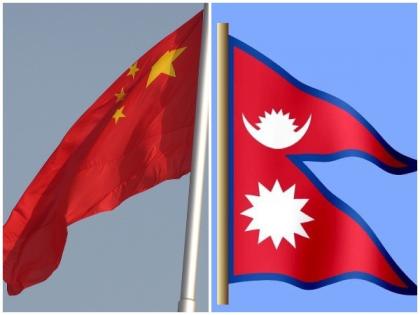China promoting new ways to engage Nepal post-MCC compact ratification
By ANI | Published: March 18, 2022 01:11 AM2022-03-18T01:11:52+5:302022-03-18T01:20:03+5:30
China is promoting new ways to engage Nepal post- Millennium Challenge Corporation (MCC) compact ratification, a grant of USD 500 million developmental assistance from the US to Kathmandu. This exploration starts with Chinese Foreign Minister Wang Yi's visit.

China promoting new ways to engage Nepal post-MCC compact ratification
China is promoting new ways to engage Nepal post- Millennium Challenge Corporation (MCC) compact ratification, a grant of USD 500 million developmental assistance from the US to Kathmandu. This exploration starts with Chinese Foreign Minister Wang Yi's visit.
The foreign ministry in Beijing has apparently concluded in its review that China's presence in Nepal is weakening. President Xi Jinping is sending Foreign Minister Wang Yi to Kathmandu to explore ways to turn things around, says the Chinese official, reported Shambhu Kattel, writing in The Annapurna Express (ApEx).
China decided to send its foreign minister to Kathmandu while the Chinese Communist Party was holding its Annual National People's Congress, suggesting an unusual level of urgency at the unfolding events in Nepal.
Unlike what has been reported in sections of Nepali media, Nepal's Ministry of Foreign Affairs as well as the Chinese official's ApEx spoke to say Wang's upcoming visit is both unplanned and unprecedented.
Chinese officials say Wang's main agenda in Kathmandu is to reassess Beijing's geopolitical and security challenges, as China no longer feels secure in Nepal.
"Implementation of the BRI projects in Nepal is important for Beijing," says a second Kathmandu-based Chinese official who has long liaised between Kathmandu and Beijing. He was also speaking on the condition of anonymity. "But this time Beijing is more worried about the security challenges emanating from the compact's approval,"
During his visit, Foreign Minister Wang will also take stock of the political climate in Kathmandu, reported ApEx.
Meanwhile, the Chinese government is also unhappy with its Kathmandu-based diplomats for their supposed failure in curbing anti-Chinese activities.
The Chinese foreign ministry believes its Nepal representative, Ambassador Hou Yanqi, has failed to stop anti-Chinese activities and to effectively coordinate with Nepali political parties.
A Chinese official associated with China's diplomatic corps in Kathmandu told ApEx that in the lead up to the compact's endorsement, there was a lack of coordination among the Chinese agencies handling Nepal. Also speaking anonymously, he said the communication gap between Beijing and the Chinese Embassy was also growing.
The official also blames ineffective coordination between Beijing and the Chinese Embassy in Kathmandu for the MCC compact's endorsement.
Nepal's federal parliament did ratify the compact, as the Americans wished, but in the run-up to ratification, Beijing tried mighty hard to stop it.
It sees the USD 500 million development grant to Nepal as a part of America's strategy to encircle China. What is beyond doubt is China's anger at the compact's parliamentary endorsement, said Kattel.
Ambassador Hou's leadership had started coming into question at the start of 2021 when she failed in her brief to keep the Nepal Communist Party (NCP) united, reported ApEx.
Beijing sees the current Nepali Congress-led government as pro-Western and anti-China. But its favourable perception of CPN (Maoist Center) led by Pushpa Kamal Dahal and CPN (Unified Socialist) led by Madhav Kumar Nepal has also changed after the compact's ratification.
The Chinese official says the CCP is unhappy with Dahal's double standards on the MCC compact.
The MCC saga has been a sobering experience for China. Beijing is reportedly reassessing its relations with Nepali leaders, particularly those it had trusted before.
( With inputs from ANI )
Disclaimer: This post has been auto-published from an agency feed without any modifications to the text and has not been reviewed by an editor
Open in app